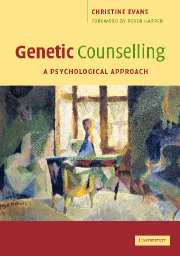Book contents
- Frontmatter
- Contents
- Acknowledgements
- Foreword
- Preface
- 1 An overview of genetic counselling
- 2 The psychological processes underlying genetic counselling
- 3 Understanding individual difference in genetic counselling using attachment theory
- 4 The role and skills of the counsellor and ideas from psychotherapy
- 5 Examples of the role and skills of the counsellor
- 6 The gene and the family system
- 7 Working with parents and children
- 8 The influence of the nature of the disorder on the consultation
- 9 The effect on the counsellor
- 10 The interview and non-directiveness
- References
- Index
7 - Working with parents and children
Published online by Cambridge University Press: 12 August 2009
- Frontmatter
- Contents
- Acknowledgements
- Foreword
- Preface
- 1 An overview of genetic counselling
- 2 The psychological processes underlying genetic counselling
- 3 Understanding individual difference in genetic counselling using attachment theory
- 4 The role and skills of the counsellor and ideas from psychotherapy
- 5 Examples of the role and skills of the counsellor
- 6 The gene and the family system
- 7 Working with parents and children
- 8 The influence of the nature of the disorder on the consultation
- 9 The effect on the counsellor
- 10 The interview and non-directiveness
- References
- Index
Summary
Awareness of the child in the consultation
This chapter continues with the theme of working with families, but in particular, the nuclear family and addresses the variety of ways parents and children come into genetic counselling. The counsellor will have gained an understanding of child development from clinical experience in paediatrics, general medicine or from the experience of being clinically involved with a number of children who have conditions which are genetically determined. It is not considered appropriate to give detailed theoretical points of child development from a cognitive or emotional perspective. Rather, the chapter begins with a general awareness of children as part of the consultation system before discussing how worries about children are considered in genetic counselling. Case examples will be presented which will demonstrate the salient points of family functioning around child problems and includes requests for testing children for adult-onset disorders.
When a child is the focus of a genetic consultation, he or she may be present in a consultation or, occasionally, parents may want to discuss their worries about their child in private. Alternatively there may be several children in a room as part of a consultation for a parent or a family. Young children can easily disrupt a consultation and some counsellors may prefer them to be looked after outside to ensure that the parents can concentrate and fully take part in the consultation. This may not be possible as a consultation is a potentially stressful encounter and children are often reluctant to leave a parent whom they sense is anxious.
- Type
- Chapter
- Information
- Genetic CounsellingA Psychological Approach, pp. 115 - 132Publisher: Cambridge University PressPrint publication year: 2006

